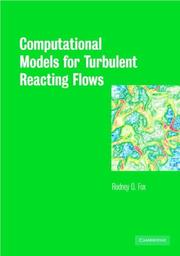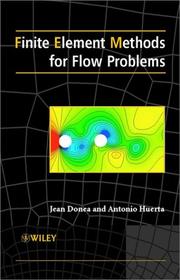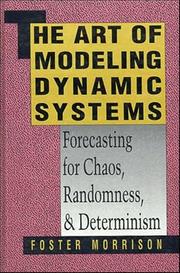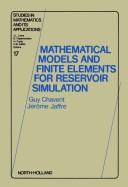| Listing 1 - 10 of 44 | << page >> |
Sort by
|
Book
ISBN: 0306436876 Year: 1990 Publisher: New York London Plenum
Abstract | Keywords | Export | Availability | Bookmark
 Loading...
Loading...Choose an application
- Reference Manager
- EndNote
- RefWorks (Direct export to RefWorks)
Book
ISBN: 981020521X Year: 1991 Publisher: Singapore New Jersey London World Scientific
Abstract | Keywords | Export | Availability | Bookmark
 Loading...
Loading...Choose an application
- Reference Manager
- EndNote
- RefWorks (Direct export to RefWorks)
Book
Year: 2001 Publisher: Amsterdam : Elsevier,
Abstract | Keywords | Export | Availability | Bookmark
 Loading...
Loading...Choose an application
- Reference Manager
- EndNote
- RefWorks (Direct export to RefWorks)

ISBN: 0471058009 9780471058007 Year: 1983 Publisher: New York, N.Y.: Wiley,
Abstract | Keywords | Export | Availability | Bookmark
 Loading...
Loading...Choose an application
- Reference Manager
- EndNote
- RefWorks (Direct export to RefWorks)
Mathematical statistics --- Automatic control --- Dynamics --- System Analysis --- Mathematical models --- System analysis. --- Mathematical models. --- Automatic control - Mathematical models --- Dynamics - Mathematical models --- Root locus in control systems --- Feedback control

ISBN: 0521650496 0521659078 9780521659079 0511077637 0511205155 0511556268 0511610106 0511076061 9780521650496 9780511610103 1107128226 9780511077630 9780511076060 0511074522 9780511074523 9781107128224 9780511205156 9780511556265 Year: 2003 Publisher: Cambridge Cambridge University Press
Abstract | Keywords | Export | Availability | Bookmark
 Loading...
Loading...Choose an application
- Reference Manager
- EndNote
- RefWorks (Direct export to RefWorks)
This book presents the current state of the art in computational models for turbulent reacting flows, and analyzes carefully the strengths and weaknesses of the various techniques described. The focus is on formulation of practical models as opposed to numerical issues arising from their solution. A theoretical framework based on the one-point, one-time joint probability density function (PDF) is developed. It is shown that all commonly employed models for turbulent reacting flows can be formulated in terms of the joint PDF of the chemical species and enthalpy. Models based on direct closures for the chemical source term as well as transported PDF methods are covered in detail. An introduction to the theory of turbulent and turbulent scalar transport is provided for completeness. The book is aimed at chemical, mechanical, and aerospace engineers in academia and industry, as well as developers of computational fluid dynamics codes for reacting flows.
Turbulence --- Combustion --- Fluid dynamics --- Mathematical models --- Turbulence. --- Engineering & Applied Sciences --- Applied Mathematics --- Mathematical models. --- Turbulence - Mathematical models --- Combustion - Mathematical models --- Fluid dynamics - Mathematical models

ISBN: 0471496669 9780471496663 Year: 2003 Publisher: New York : John Wiley,
Abstract | Keywords | Export | Availability | Bookmark
 Loading...
Loading...Choose an application
- Reference Manager
- EndNote
- RefWorks (Direct export to RefWorks)
"The objective [of this book] is to present the fundamentals of stabilized finite element methods for the analysis of steady and time-dependent convection-diffusion and fluid dynamics problems with an engineering rather than a mathematical bias." -- p. XI.
Finite element method --- Galerkin methods --- Fluid dynamics --- Mathematical models --- Finite element method. --- Galerkin methods. --- Mathematical models. --- Éléments finis, Méthode des --- Fluid dynamics. --- Fluid dynamics - Mathematical models --- Flow

ISBN: 0471520047 9780471520047 Year: 1991 Publisher: New York, N.Y.: Wiley,
Abstract | Keywords | Export | Availability | Bookmark
 Loading...
Loading...Choose an application
- Reference Manager
- EndNote
- RefWorks (Direct export to RefWorks)
Dynamics --- Chaotic behavior in systems --- Stochastic processes --- Processus stochastiques --- Mathematical models --- Modèles mathématiques --- Dynamique --- Chaos --- Modèles mathématiques --- Congresses --- Dynamics - Mathematical models --- Chaotic behavior in systems - Mathematical models --- Stochastic processes - Mathematical models

ISBN: 9780444700995 0444700994 9780080875385 0080875386 9786611797850 1281797855 Year: 1986 Volume: 17 Publisher: Amsterdam: North-Holland,
Abstract | Keywords | Export | Availability | Bookmark
 Loading...
Loading...Choose an application
- Reference Manager
- EndNote
- RefWorks (Direct export to RefWorks)
Numerical simulators for oil reservoirs have been developed over the last twenty years and are now widely used by oil companies. The research, however, has taken place largely within the industry itself, and has remained somewhat inaccessible to the scientific community. This book hopes to remedy the situation by means of its synthesized presentation of the models used in reservoir simulation, in a form understandable to both mathematicians and engineers.The book aims to initiate a rigorous mathematical study of the immiscible flow models, partly by using the novel `global pressure' ap
Oil reservoir engineering --- Fluid dynamics --- Finite element method --- Mathematical models --- Finite element method. --- Mathematical models. --- Oil reservoir engineering - Mathematical models --- Fluid dynamics - Mathematical models --- FEA (Numerical analysis) --- FEM (Numerical analysis) --- Finite element analysis --- Numerical analysis --- Isogeometric analysis
Book
ISBN: 3642101356 3642002919 9786612332838 128233283X 3642002927 Year: 2009 Publisher: Dordrecht ; New York : Springer,
Abstract | Keywords | Export | Availability | Bookmark
 Loading...
Loading...Choose an application
- Reference Manager
- EndNote
- RefWorks (Direct export to RefWorks)
The monograph is devoted to modern mathematical models and numerical methods for solving gas- and fluid-dynamic problems based on them. Two interconnected mathematical models generalizing the Navier–Stokes system are presented; they differ from the Navier–Stokes system by additional dissipative terms with a small parameter as a coefficient. The new models are called the quasi-gas-dynamic and quasi-hydrodynamic equations. Based on these equations, effective finite-difference algorithms for calculating viscous non-stationary flows are constructed and examples of numerical computations are presented. The universality, the efficiency, and the exactness of the algorithms constructed are ensured by the fulfillment of integral conservation laws and the theorem on entropy balance for them. The book is a course of lectures and is intended for scientists and engineers who deal with constructing numerical algorithms and performing practical calculations of gas and fluid flows and also for students and post-graduated students who specialize in numerical gas and liquid dynamics.
Fluid dynamics -- Mathematical models. --- Gas dynamics -- Mathematical models. --- Gas dynamics --- Fluid dynamics --- Applied Mathematics --- Engineering & Applied Sciences --- Mathematical models --- Fluid dynamics. --- Gas dynamics. --- Navier-Stokes equations --- Numerical solutions. --- Gasdynamics --- Engineering. --- Computer mathematics. --- Fluids. --- Fluid mechanics. --- Engineering Fluid Dynamics. --- Fluid- and Aerodynamics. --- Computational Science and Engineering. --- Numerical analysis --- Thermodynamics --- Dynamics --- Fluid mechanics --- Hydraulic engineering. --- Computer science. --- Informatics --- Science --- Engineering, Hydraulic --- Engineering --- Hydraulics --- Shore protection --- Computer mathematics --- Electronic data processing --- Mathematics --- Mechanics --- Physics --- Hydrostatics --- Permeability --- Hydromechanics --- Continuum mechanics
Book
ISBN: 1283396246 9786613396242 0123851254 0123851246 9780123851253 9780123851246 Year: 2012 Publisher: Oxford ; Boston : Gulf Professional Pub.,
Abstract | Keywords | Export | Availability | Bookmark
 Loading...
Loading...Choose an application
- Reference Manager
- EndNote
- RefWorks (Direct export to RefWorks)
Managed Pressure Drilling Operations is a significant technology worldwide and beginning to make an impact all over the world. Often reservoir and drilling engineers are faced with the decision on how best to construct a well to exploit zones of interest while seeking to avoid drilling problems that contribute to reservoir damage or cause loss of hole. The decision to pursue a MPD operation is based on the intent of applying the most appropriate technology for the candidate and entails either an acceptance of influx to the surface or avoidance of influx into the wellbore. In today's
Managed pressure drilling (Petroleum engineering). --- Oil well drilling. --- Wells - Fluid dynamics - Mathematical models. --- Wells -- Fluid dynamics -- Mathematical models. --- Managed pressure drilling (Petroleum engineering) --- Oil well drilling --- Wells --- Mechanical Engineering --- Engineering & Applied Sciences --- Metallurgy & Mineralogy --- Fluid dynamics --- Mathematical models --- Mathematical models. --- Tube wells --- Water wells --- Hydraulic structures --- Well water --- Drilling, Oil well --- Oil well boring --- Petroleum --- Well drilling, Oil --- Boring --- Oil fields --- Petroleum engineering --- MPD (Managed pressure drilling) --- Gas well drilling --- Well-boring --- Production methods
| Listing 1 - 10 of 44 | << page >> |
Sort by
|

 Search
Search Feedback
Feedback About UniCat
About UniCat  Help
Help News
News